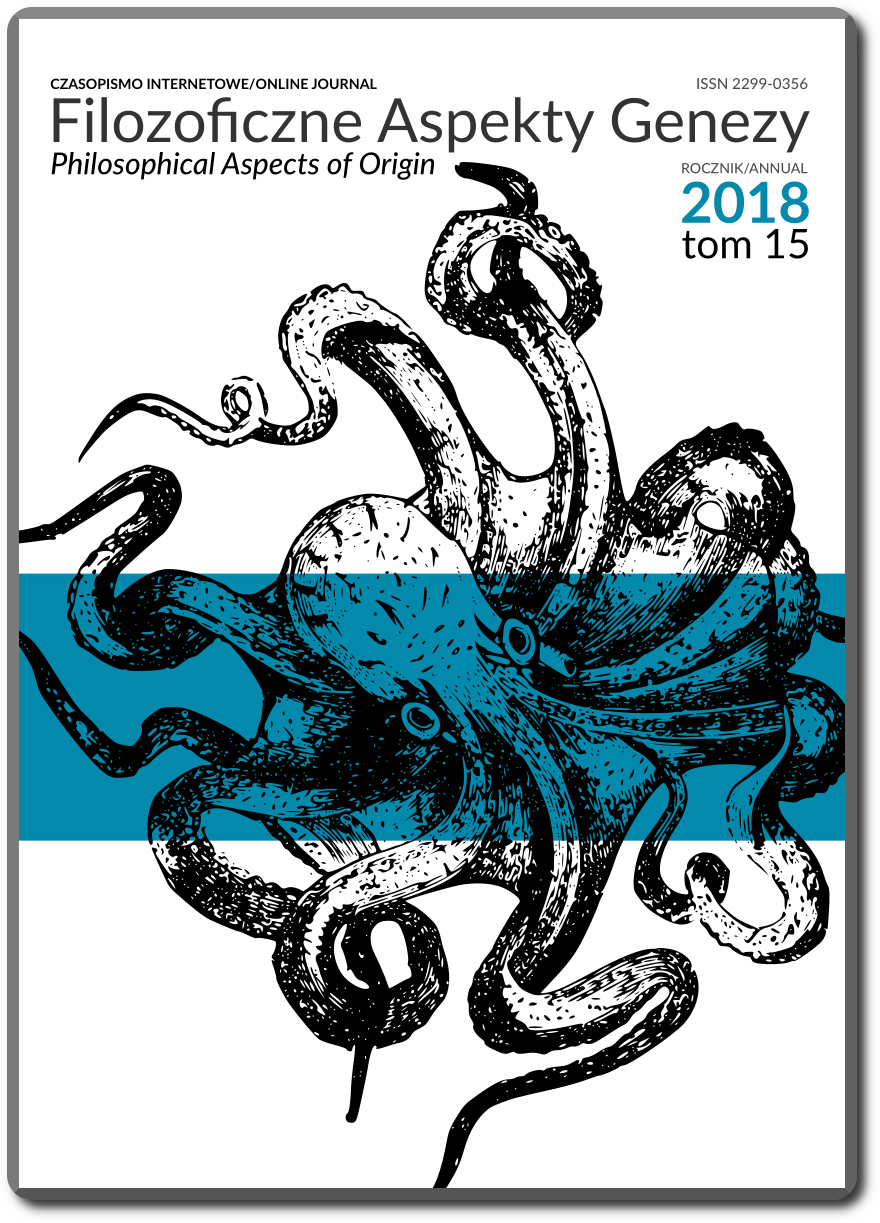Opublikowane 25.05.2021
Słowa kluczowe
- teleologia,
- pochodzenie ewolucji,
- darwinizm,
- związek między genotypem a fenotypem,
- teleonomia
- eleologia wewnętrzna,
- system translacji,
- kod genetyczny ...More

Utwór dostępny jest na licencji Creative Commons Uznanie autorstwa 4.0 Międzynarodowe.
Jak cytować
Abstrakt
Ewolucja darwinowska nie jest synonimem zmiany, lecz wyjątkowym procesem biologicznym. Biochemiczny mechanizm ewolucji jest inny niż wynikało to z obserwacji Darwina dotyczących dziedzicznej zmienności i doboru naturalnego. Kluczem do ewolucji biologicznej jest ścisły związek między dziedziczonym genotypem a zależnym od genów fenotypem. Dzięki temu związkowi fenotyp może stanowić przedmiot selekcji. Jest teoretycznie możliwe, by pewne formy życia nie podlegały ewolucji. Pochodzenie życia i pochodzenie ewolucji to dwa odrębne problemy badawcze. Klasyczny problem teleologii w biologii da się rozwiązać dzięki starannemu zbadaniu mechanizmu odpowiadającego za związek między genotypem a fenotypem, czyli mechanizmu syntezy białek lub systemu translacji. Ten mechanizm przekształcania chemii kwasów nukleinowych w chemię białek może stanowić fundamentalne źródło teleonomii i wewnętrznej teleologii w organizmach żywych.
Downloads
Bibliografia
- Alexander Denis R. and Numbers Ronald L. (eds.), Biology and Ideology from Descartes to Dawkins, University of Chicago Press, Chicago, Illinois 2010.
- Antonoff Michael, „Software by Natural Selection”, Popular Science October 1991, s. 70-74.
- Arthur W. Brian, The Nature of Technology: What It Is and How It Evolves, Free Press, New York 2009.
- Ayala Francisco J., „Teleological Explanations in Evolutionary Biology”, Philosophy of Science 1970, vol. 37, no. 1, s. 1-15.
- Committee on the Limits of Organic Life in Planetary Systems, Committee on the Origins and Evolution of Life, and National Research Council, The Limits of Organic Life in Planetary Systems, The National Academies Press, Washington, DC. 2007.
- Conway Morris Simon, Life’s Solution: Inevitable Humans in a Lonely Universe, Cambridge University Press, New York 2004.
- Copley Shelley D., Smith Eric, and Morowitz Harold J., „A Mechanism for the Association of Amino Acids with Their Codons and the Origin of the Genetic Code”, Proceedings of the National Academy of Sciences of the USA 2005, vol. 102, no. 12, s. 4442-4447.
- Cunningham Conor, Darwin’s Pious Idea: Why the Ultra-Darwinists and Creationists Both Get It Wrong, Eerdmans, Grand Rapids, Michigan 2010.
- Darwin Karol, O powstawaniu gatunków drogą doboru naturalnego, czyli o utrzymaniu się doskonalszych ras w walce o byt, tekst polski na podstawie przekładu Szymona Dicksteina i Józefa Nusbauma opracowały Joanna Popiołek i Małgorzata Yamazaki, Wydawnictwa Uniwersytetu Warszawskiego, Warszawa 2009.
- Dawkins Richard, Ślepy zegarmistrz, czyli jak ewolucja dowodzi, że świat nie został zaplanowany, przeł. Antoni Hoffman, Biblioteka Myśli Współczesnej, Państwowy Instytut Wydawniczy, Warszawa 1994.
- Dennett Daniel C., Darwin’s Dangerous Idea, Simon & Schuster, New York 1995.
- Dennett Daniel C., Dźwignie wyobraźni i inne narzędzia do myślenia, przeł. Łukasz Kurek, Copernicus Center Press, Kraków 2015.
- England Jeremy L., „Statistical Physics of Self-Replication”, Journal of Chemical Physics 2013, vol. 139, 121923.
- Fisher Ronald A., The Genetical Theory of Natural Selection, Clarendon Press, Oxford, UK 1930.
- Futuyma Douglas J., Ewolucja, przekł. pod red. Jacka Radwana, Wydawnictwa Uniwersytetu Warszawskiego, Warszawa 2008.
- Garte Sy, „Nowe idee w biologii ewolucyjnej: od NDMS do EES”, przeł. Dariusz Sagan, Filozoficzne Aspekty Genezy 2018, t. 15, s. 1-26, http://www.nauka-a-religia.uz.zgora.pl/images/FAG/2018.t.15/art.02.pdf (21.11.2018).
- Gould Stephen Jay, Full House: The Spread of Excellence from Plato to Darwin, Harmony Books, New York 1996.
- Gray Terry M., „Biochemistry and Evolution”, w: MILLER (ed.), Perspectives on an Evolving Creation…, s. 256-287.
- Hull David, Philosophy of Biological Science, Foundations of Philosophy Series, Prentice-Hall, Englewood Cliffs, New Jersey 1973.
- Johnson Allen W. and Earle Timothy, The Evolution of Human Societies: From Foraging Group to Agrarian State, Stanford University Press, Stanford, California 1987.
- Joyce Gerald F., „Directed Evolution of Nucleic Acid Enzymes”, Annual Review of Biochemistry 2004, vol. 73, s. 791-836.
- Lane Nick, Pytanie o życie. Energia, ewolucja i pochodzenie życia, przeł. Adam Tuz, Na Ścieżkach Nauki, Prószyński i S-ka, Warszawa 2016.
- Luria Salvador E. and Delbrück Max, „Mutations of Bacteria from Virus Sensitivity to Virus Resistance”, Genetics 1943, vol. 28, no. 6, s. 491-511.
- Mayr Ernst, Evolution and the Diversity of Life — Selected Essays, Belknap Press, Cambridge, Massachusetts 1976.
- Mayr Ernst, Toward a New Philosophy of Biology: Observations of an Evolutionist, Harvard University Press, Cambridge, Massachusetts 1988.
- McGrath Alister, Darwinism and the Divine: Evolutionary Thought and Natural Theology, Wiley-Blackwell, Oxford 2011.
- McGrath Alister, „The Ideological Uses of Evolutionary Biology in Recent Atheist Apologetics”, w: Alexander and Numbers (eds.), Biology and Ideology…, s. 329-351.
- Meyer Stephen C., Signature in the Cell: DNA and the Evidence for Intelligent Design, HarperOne, New York 2009.
- Miller Keith B. (ed.), Perspectives on an Evolving Creation, Eerdmans, Grand Rapids, Michigan 2003.
- Monod Jacques, Przypadek i konieczność. Esej o filozofii biologii współczesnej, przeł. Jędrzej Bukowski, Biblioteka „Głosu”, Warszawa 1979.
- Morowitz Harold and Smith Eric, „Energy Flow and the Organization of Life”, Complexity 2007, vol. 13, s. 51-59.
- Peters Ted and Hewlett Martinez, Evolution from Creation to New Creation: Conflict, Conversation, and Convergence, Abingdon Press, Nashville, Tennessee 2003.
- Shanahan Timothy, „Evolutionary Progress from Darwin to Dawkins”, Endeavour 1999, vol. 23, s. 171-174.
- Sousa Filipa L., Thiergart Thorsten, Landan Giddy, Nelson-Sathi Shijulal, Pereira Inês A.C., Allen John F., Lane Nick, and Martin William F., „Early Bioenergetic Evolution”, Philosophical Transactions of the Royal Society B: Biological Sciences 2013, vol. 368, no. 1622, 20130088.
- Wilcox David L., „A Proposed Model for the Evolutionary Creation of Human Beings: From the Image of God to the Origin of Sin”, Perspectives on Science and Christian Faith 2016, vol. 68, no. 1, s. 22-43.
- Wolf Yuri I. and Koonin Eugene V., „On the Origin of the Translation System and the Genetic Code in the RNA World by Means of Natural Selection, Exaptation, and Subfunctionalization”, Biology Direct 2007, vol. 2, no. 14.
- Yarus Michael, Widmann Jeremy J., and Knight Rob, „RNA-Amino Acid Binding: A Stereochemical Era for the Genetic Code”, Journal of Molecular Evolution 2009, vol. 69, no. 5, s. 406-429.



